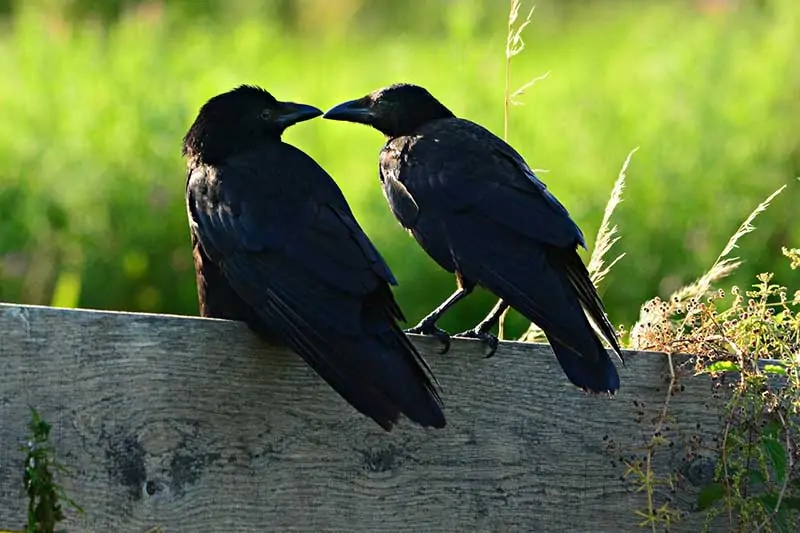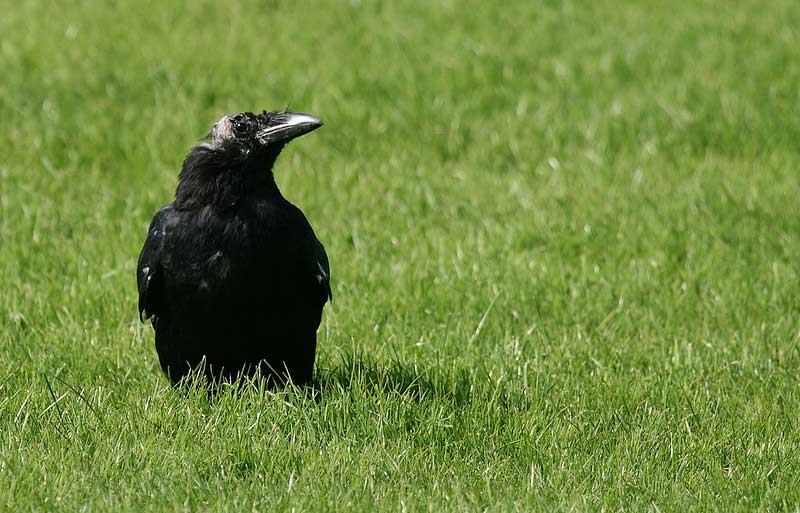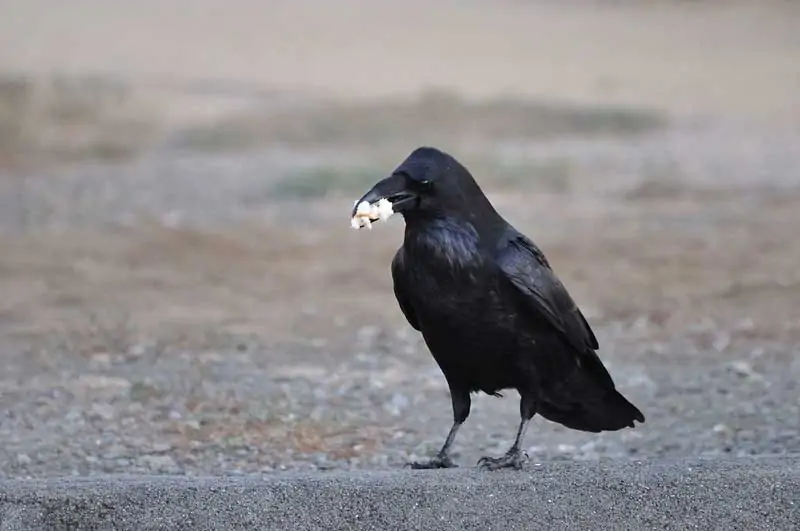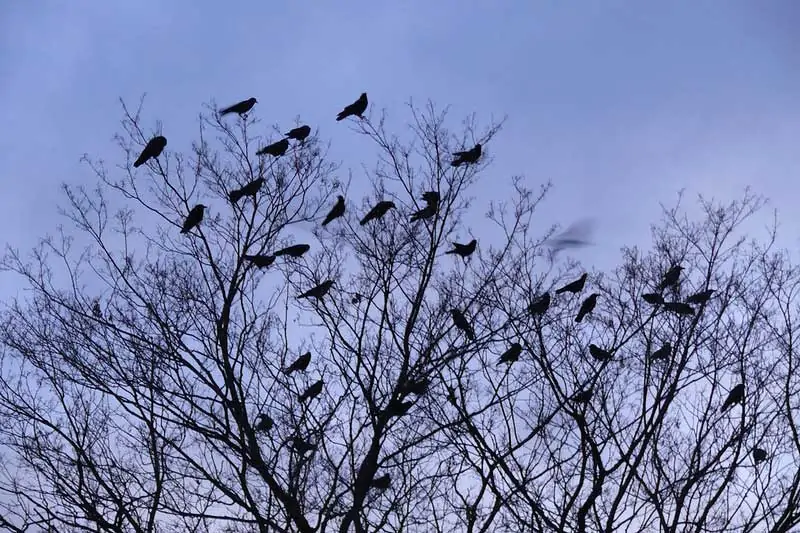Associated with bad omens, witch familiars, and pests, crows in the United States don’t have the best reputation. We put up scarecrows to keep them out of gardens. They are also supposedly egg thieves, who rob the nests of other birds, and eat everything in sight. Which brings us to the main topic of this article, what do crows eat?
First though, do crows deserve all this negative attention? Many Native American tribes thought of them as good luck and considered crows a symbol of wisdom.
Crows are members of the Corvid family of birds, that also includes ravens, magpies, jackdaws, and blue jays. Corvids are possibly the most intelligent genus of birds. Parrots are typically praised for their brains, crows and other Corvids have an equally good problem-solving ability. Crows can count to 8, understand cause and effect, and even use tools to help themselves retrieve food. Some crows even have brains proportionately larger than some humans!

Corvids, including crows, can recognize faces and will hold a grudge. There are reports of crows passing these grudges along to their family. One of the most interesting facts about crows is their habit of bringing gifts to people who feed them, or with whom they’ve established a bond.
Are you concerned about crows attacking songbirds in your neighborhood? Or maybe you’ve seen some crows near your house and you’d like to make friends. Keep reading to find out more about the dietary habits of crows, and if they really do pose a danger to crops and other birds.
What do crows eat?
Crows are omnivores, which means they will eat just about anything. Their typical diet consists of grains, seeds, nuts, fruits, eggs, and occasionally other birds. Crows are among the smartest animals in the world aside from humans and will work together to find food. There are stories of one crow distracting adult birds from a nest, so the other could grab the eggs.
Crows will also scavenge on occasion. They are not meant to be strict scavengers. Their beaks are not sharp enough to make eating carcasses easy. When they do scavenge it is usually on carcasses that are decayed enough to be soft, or that is already open.
Worms, insects, and small animals round out the crow’s diet. They can often be seen hopping along the ground searching for insects.

Should you feed crows?
If you start feeding crows, don’t be surprised if they come back and bring a few friends. If you feed them regularly, they will see you as an easy food source and keep coming back. There are some claims that feeding birds, and crows in particular, will attract mice and rats. Since crows will make a meal out of mice and rats, this isn’t really something to be concerned about, especially if you keep the area around their feeding station clean.
Crows know how to find food, so if you suddenly stop feeding them, they will move on to another easy food source, so there is no need to worry about them growing dependent on you. Crows have a feeding range of around 40 miles, so they will have other food sources.

If you want to start feeding the crows in your backyard consider feeding them these things, but you are just as likely likely to attract various songbirds.
- Peanuts
- Cracked corn
- Millet
- Sunflower seeds
- pumpkin seeds
- Berries
Crows can be particular in their tastes, and if they don’t like something you have put out for them, they will ignore it. You can figure out their favorite foods by watching them and seeing which foods they respond to.
Crows usually prefer to eat on the ground, so set up a feeding station that is either on or low to the ground.

Is it bad or illegal to feed crows?
While it may not be specifically illegal to feed crows, check your jurisdiction to find out the laws about feeding wild animals that could be a nuisance. You may not consider having crows in your yard problematic, but some of your neighbors might. If you are not violating any laws there is no reason you should worry about feeding crows if you’re concerned about their well being. You should, however, consult with your neighbors. There are many instances of legal battles occurring because of a neighbor feeding crows.
Crows have a reputation for destroying gardens, but this is largely unearned. Crows love to eat caterpillars and other bugs they see, and much of the damage attributed to crows is the result of other animals and pests. Having crows around will actually remove garden pests, but they may help themselves to a few snacks from your garden to reward themselves.
Do crows eat other birds or keep them away?
Most people are afraid the crows will chase away or decimate the songbird population in their area. Crows do eat other birds and will raid nests for eggs. They are not the only species that engages in this practice. Owls and hawks also do this. A decrease in songbirds may not be the result of crows at all but of nocturnal raptor species that you may not have noticed moving into the area.
There have been scientific studies to determine the effect of crows on songbird populations. The results showed that removing crows had very little effect. Hawks, owls, and snakes are also songbird predators, and the destruction of their habitat also comes into play when discussing decreasing songbird numbers.
Other animals that crows may eat
Crows have a very diverse diet, and will eat just about anything. Along with insects, seeds, nuts, berries, and even smaller birds, crows will also eat:
- Voles
- Mice
- Frogs and toads
- Lizards
- Grubs
- Worms
- Fish
- Snails and slugs
Crow problems (6 reasons why crows are a nuisance)
Crows occasionally stopping by for a visit may not be that much of a nuisance, but when they flock there can be problems that start to arise. Crows gather in groups in fall and winter, and they flock to the same place year after year, with people encroaching on their territory this can cause issues as they flock to areas that are now occupied by people. Groups of crows can also be damaging to agriculture, particularly around planting time. Some problems caused by crows are:
- Flocks can cause structural damage from excessive feces. The uric acid in their feces breaks down masonry.
- Flocking crows are loud and can overwhelm trees and buildings and harass people and other animals.
- Bacteria in their feces can spread parasites and bacteria such as histoplasmosis.
- They will steal food and even jewelry and other personal items from people.
- Crows will grab freshly planted wheat and corn from fields.
- They are technically songbirds, and their cawing is loud and considered a disturbance by many people, especially when large groups of crows get vocal.
You can appreciate crows, and still want to keep them at a distance. If you would like to keep crows from gathering around you there are some precautions you can take. Hanging a fake dead crow will scare them off. Large shiny objects, like hubcaps, have some effect keeping crows away as well. Keep your garbage covered, since crows will root through it.
You can try to cover your plants with netting to keep crows out, but they are problem solvers and may be able to find a way around it. If you enjoy feeding smaller songbirds, use small feeders that are inaccessible to larger birds. You may also need to accept that you can’t keep your yard completely crow free. They are highly intelligent birds, and eventually, realize when they’re being tricked.





